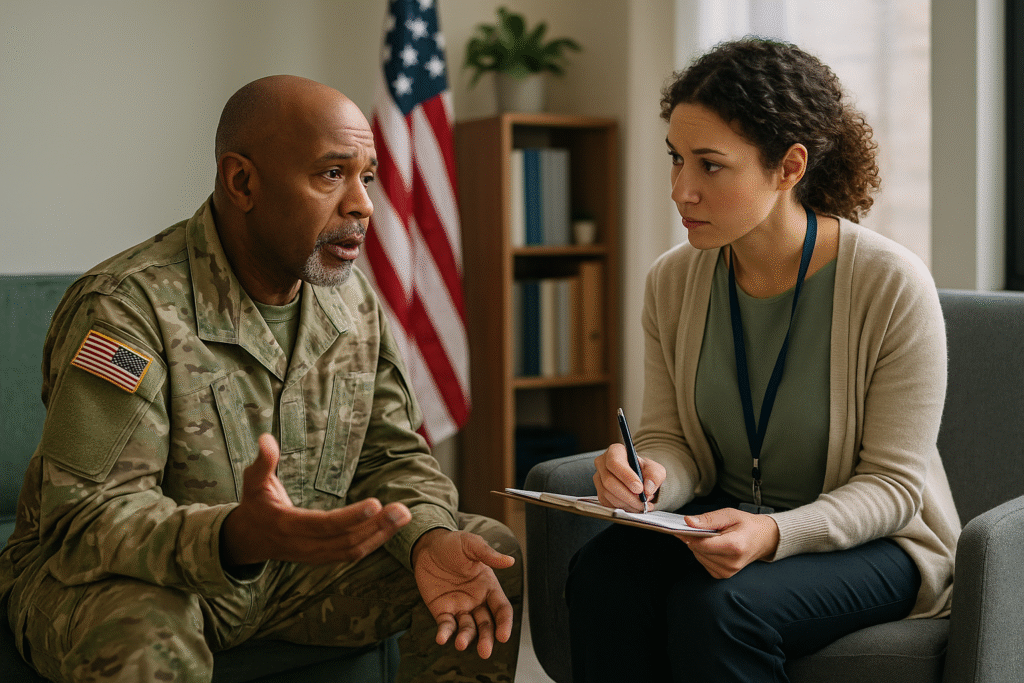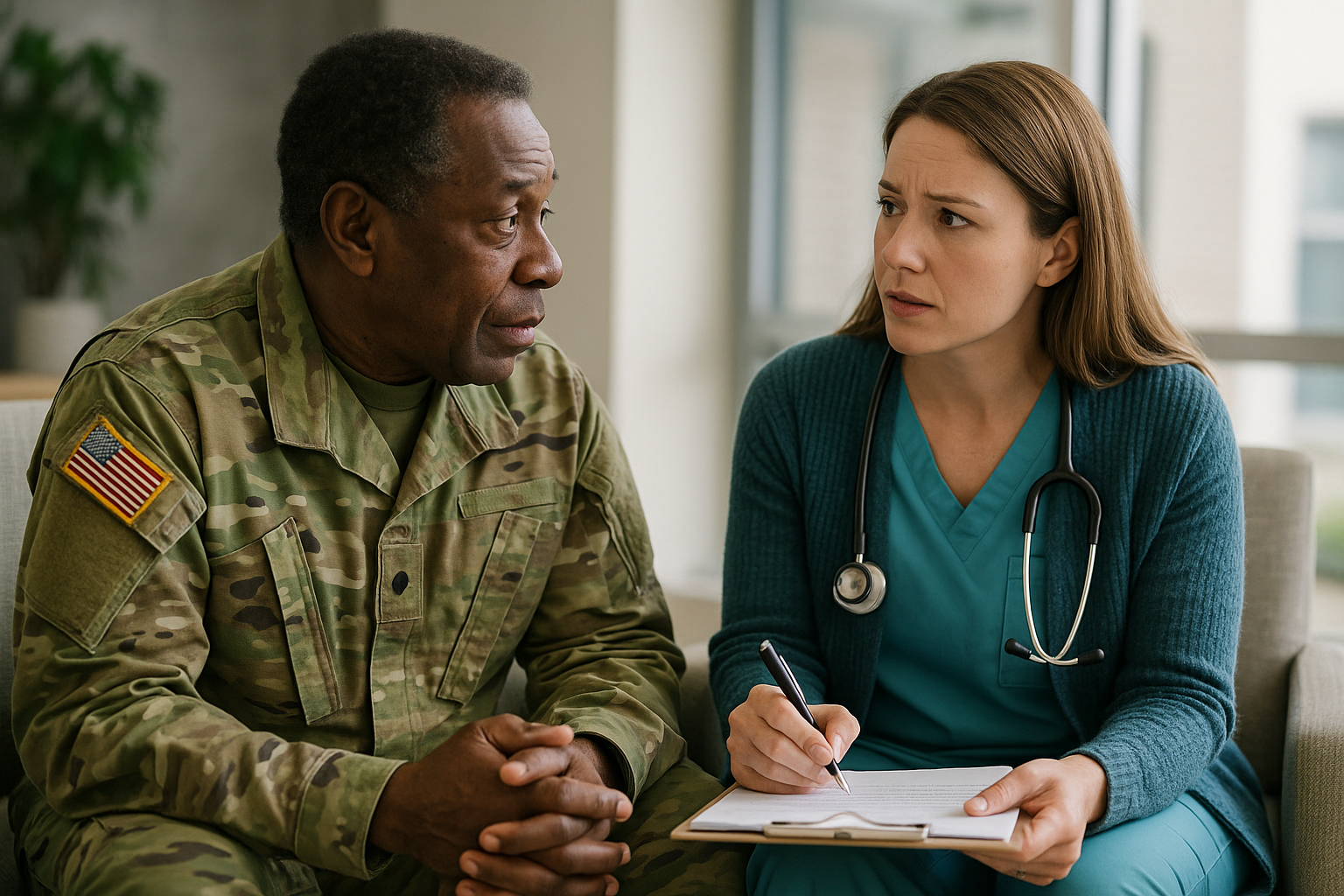Mental health and substance abuse help: If you’re a veteran (or supporting one) and need help with mental health or substance use, the VA and federal partners offer clear routes to fast, confidential care. This friendly, practical guide walks you through what to call, where to go, how to start treatment, and what to expect — step by step.
Quick essentials — what to know right now
- Crisis help is available 24/7: Dial 988 then press 1, text 838255, or chat online to reach the Veterans Crisis Line. Help is confidential and immediate.
- VA care is broadly available: All veterans can access mental health services at VA medical centers and Vet Centers; discharge status does not automatically block access to some services.
- If you already have VA health benefits you can get substance use disorder treatment through local VA medical centers or specialized programs.
1) If you’re in crisis — call or text right now
Mental health and substance abuse help: If someone is an immediate danger to themselves or others, call 911. For veteran-specific crisis support call 988, then press 1; text 838255; or use the online chat. The Veterans Crisis Line connects you with trained responders 24/7 — you don’t need to be enrolled in VA health care to use it. Keep this number saved.
2) Getting started: two fast entry points to VA care
You have two main, practical ways to begin VA mental health care:
- VA Medical Center (VAMC): If you’re enrolled in VA health care, contact your local VA medical center to make an appointment for mental health or substance use services. VA offers outpatient counseling, telehealth, inpatient treatment, and specialized programs.
- Vet Centers (Readjustment Counseling): Vet Centers provide free, confidential counseling in a non-medical setting for combat veterans and their families — often with easier intake and community-style support. Even veterans not enrolled in VA health benefits can often access Vet Center services.
If you’re unsure where to start, call 1-877-222-8387 for help finding the right VA resources and next steps.
3) Substance use disorder (SUD) care at the VA — what to expect
The VA offers a spectrum of SUD care:
- Medication-assisted treatment (MAT) (e.g., buprenorphine, naltrexone) combined with counseling for opioid or alcohol use disorders.
- Outpatient counseling and therapy, including cognitive behavioral therapy and group support.
- Intensive outpatient and residential programs for higher-level care and stabilization.
If you have VA health benefits, start at your VAMC or ask a Vet Center to refer you. If you’re not enrolled in VA care, crisis lines and Vet Centers can still connect you to services and referrals.

4) Practical step-by-step: how to make the first call or appointment
- If immediate danger: call 911.
- If urgent but not life-threatening: call 988 → press 1, text 838255, or chat online (Veterans Crisis Line).
- To access ongoing VA care: call your local VA medical center’s mental health clinic or Vet Center — or call 1-877-222-8387 to ask what to do next.
- Have this ready if you can: name, branch, last four of SSN, current medications, a short summary of your concern, and any immediate safety risks. That speeds triage and referral.
5) What happens at intake — realistic expectations
When you connect with VA or a Vet Center you’ll typically get:
- A brief screening for safety and immediate risk (suicidal ideation, overdose risk).
- An assessment of mental health and substance use history.
- A personalized recommendation (e.g., same-day counseling, MAT evaluation, outpatient program, or residential care).
- Scheduling for follow-up appointments and, where appropriate, prescriptions or referrals for medication.
Be persistent: if you encounter wait times, ask about interim options such as telehealth visits, peer support, or naloxone for opioid risk reduction.
6) If you don’t have VA enrollment or insurance
You can still access crisis support and Vet Center counseling even without VA enrollment. For longer-term treatment, Vet Centers and the Veterans Crisis Line can connect you to local community programs, sliding-scale clinics, or SAMHSA resources that work with veterans. SAMHSA also has veteran-specific guidance and links to local treatment.
7) Family, caregivers, and next steps to support a veteran
If you’re helping a loved one:
- Call the Crisis Line on their behalf if they’re at immediate risk.
- Offer to accompany them to a Vet Center or VAMC intake appointment.
- Ask about family counseling and caregiver support services offered by VA. Vet Centers often welcome family involvement in treatment planning.
Quick FAQ
Q: Is Vet Center counseling confidential?
Yes — Vet Centers provide confidential readjustment counseling and usually operate outside the medical record system, though there are exceptions for imminent risk or safety.
Q: Do I have to be enrolled in VA health care to use the Veterans Crisis Line?
No — the Veterans Crisis Line is available to all veterans and their families, whether or not they are enrolled in VA health care.
Q: Will seeking help affect my VA benefits or security clearance?
Seeking mental health care is a step toward recovery. Eligibility or clearance issues are complex — if you have concerns, ask a VA intake specialist or legal advisor for details about confidentiality and how treatment records may be used.
Immediate contacts & official pages (clickable)
- Mental health and substance abuse help for veterans — USA.gov (overview). (USAGov)
https://www.usa.gov/veterans-mental-health - Veterans Crisis Line — Dial 988 then press 1 | Text 838255 | Chat. (veteranscrisisline.net)
https://www.veteranscrisisline.net/ - VA Mental Health Services — types of care, how to get started. (Veterans Affairs)
https://www.va.gov/health-care/health-needs-conditions/mental-health/ - Vet Centers (readjustment counseling) — find local Vet Center and call options. (vetcenter.va.gov)
https://www.vetcenter.va.gov/ - SAMHSA — veteran-focused substance use resources and treatment locator. (SAMHSA)
https://www.samhsa.gov/find-support/how-to-cope/veterans
Disclaimer: This article is for informational purposes only and does not replace medical advice. If you or someone else is in immediate danger, call 911. Confirm eligibility, appointment details, and program availability directly with VA or Vet Center staff — program rules and services can change. Images used in this article are royalty‑free or licensed for commercial use and are provided here for illustrative purposes.
